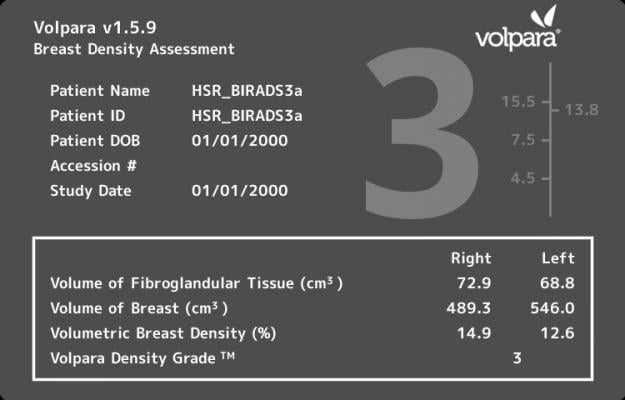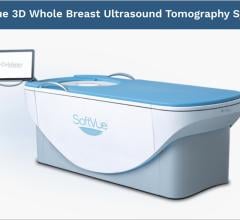
July 30, 2014 — A prospective clinical study conducted by the Karolinska Institute in Sweden has validated the performance of VolparaDensity breast imaging software across multiple vendor platforms and has associated volumetrically assessed breast density measurements to breast cancer risk. Published in Cancer Epidemiology, Biomarkers & Prevention (DOI: 10.1158/1055-9965.EPI-13-1219), the article, "Automated measurement of volumetric mammographic density: a tool for widespread breast cancer risk assessment," was authored by Judith Brand, Kamila Czene, John Shepherd, Karin Leifland, Boel Heddson, Ann Sundbom, Jingmei Li, Keith Humphreys and Per Hall.
"Mammographic density is a strong risk factor for breast cancer and an important determinant of screening sensitivity," said Prof. Per Hall from the Karolinska's Department of Medical Epidemiology and Biostatistics. "Since the widespread application of mammographic density is highly dependent on the accuracy and reliability of its measurement, we studied the performance of VolparaDensity in a large prospective cohort study," he explained. Hall also noted that, "This is the first large-scale study associating VolparaDensity's assessment results with breast cancer risk."
KARMA (KARolinska MAmmography project for risk prediction of breast cancer) is a prospective cohort study initiated in January 2011 and comprises 70,876 women attending mammography screening or clinical mammography at four hospitals in Sweden. Digital mammography was performed using five different models from three manufacturers (GE Medical Systems, Philips Healthcare and Sectra Imtec AB). Volumetric breast density was measured for each participant using VolparaDensity. Study participants also donated blood for genotyping and filled out a detailed questionnaire.
Results demonstrated that in a high-throughput setting VolparaDensity performs well and in accordance with the behavior of established density measures. Volumetric density was positively associated with iparity (never having given birth), age at first birth, hormone use, benign breast disease and family history of breast cancer, and negatively with age and postmenopausal status. Importantly, the method showed good agreement by side and by view and distributions of volume density were similar across the different mammography systems. Based on the results, researchers concluded that automated measurement of volumetric mammographic density using VolparaDensity is a promising tool for widespread breast cancer risk assessment.
"One of the limitations of current screening strategies," according to Volpara Solutions Chief Scientist and CEO, Ralph Highnam, "is that they are based solely on age, ignoring the fact that a woman's lifetime risk is determined by other common risk factors. After age, mammographic density is the strongest breast cancer risk factor. As a result of the Karolinska's study, VolparaDensity's volumetric assessment of mammographic density is continuing to display its promise as a highly effective tool for optimizing screening programs where resources and extra imaging modalities can be targeted to those with the highest density.
Cleared by the U.S. Food and Drug Administration (FDA), HealthCanada, the TGA and CE-marked, VolparaDensity is used by radiologists to objectively assess density from both digital mammography and tomosynthesis images to help doctors evaluate who might benefit from additional screening. Highly correlated to breast magnetic resonance imaging (MR) assessments, VolparaDensity is a reliable tool that automatically generates an objective measurement of volumetric breast density correlated to the ACR (American College of Radiology) breast density categories. To date, more than 3 million women have had their breast density analyzed, using VolparaDensity. VolparaDensity is part of a suite of quantitative breast imaging tools built on the VolparaSolutions algorithm that allows for personalized measurements of density, patient dose, breast compression and other factors designed to help maintain accuracy and consistent quality in breast screening.
For more information: karmastudy.org


 July 29, 2024
July 29, 2024 








